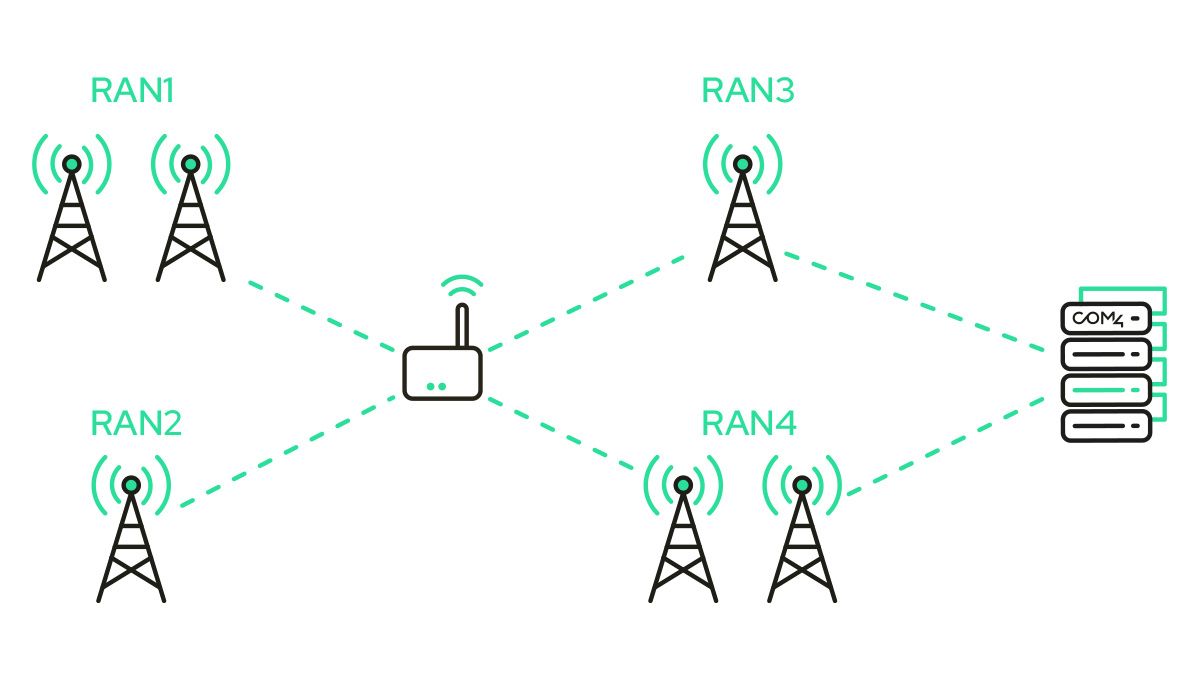However, with the advancement of the Remote SIM Provisioning (RSP), IoT providers can now streamline global deployments by using a single SIM that adheres to regional and regulatory stipulations, ensuring secure and compliant connectivity.
Table of Contents
-
Understanding Permanent Roaming and Its Impact on IoT
-
Challenges of IoT Deployment in a Permanently Roaming World
-
Global Permanent Roaming Restrictions by Country
-
Achieving Global IoT Compliance with Remote SIM Provisioning (RSP) Technology
-
How Com4 Supports IoT Deployments with Global Connectivity Solutions
-
Key Benefits of a Single SIM for Global IoT Deployments
Understanding Permanent Roaming and Its Impact on IoT
Traditional SIM cards enable devices to connect to different networks when in foreign countries via roaming agreements between an MVNO (Mobile Virtual Network Operator) or MNO (Mobile Network Operator) and local MNOs. Roaming is categorized as either transient or permanent. While transient roaming is suitable for short-term visits (like a business trip), permanent roaming applies to IoT devices deployed long-term in various countries.
Permanent roaming restrictions can impact IoT deployments significantly. In many cases, local MNOs are required or permitted to terminate connections that have been active for over 90 days, affecting IoT asset tracking, narrowband IoT (NB-IoT), and other critical services. These restrictions often arise due to national cybersecurity concerns, economic policies, or MNOs seeking to optimize network performance and spectrum utilization.
 Com4 is fully integrated with more than 750 networks worldwide, offering extensive global connectivity.
Com4 is fully integrated with more than 750 networks worldwide, offering extensive global connectivity.
Challenges of IoT Deployment in a Permanently Roaming World
IoT solutions often require long-term operational devices, making them particularly vulnerable to permanent roaming restrictions. To comply, companies face two options: using local SIMs with direct roaming agreements or utilizing SIM cards that can be remotely reprogrammed over-the-air (OTA) through Remote SIM Provisioning (RSP). The former involves significant costs and operational complexity, especially when deploying IoT solutions across multiple countries with varying regulations.
By leveraging RSP-enabled SIM cards, companies can use a single SIM for all their products, regardless of the country. These SIMs switch between preloaded or downloaded profiles to localize connectivity, ensuring compliance with regional IoT platform pricing, regulatory requirements, and network policies.
Global Permanent Roaming Restrictions by Country
Australia: Like North America, MNOs in Australia enforce commercially motivated restrictions on permanent roaming, often leading to bans or strict limitations.
Brazil: Brazil's government has implemented a 90-day limit on permanent roaming. After this period, the SIM must either be localized or disconnected from the network, requiring adaptation or removal to stay compliant.
China: China also bans permanent inbound roaming, preventing long-term usage of foreign SIMs within its borders.
Egypt: Egypt has strict local data laws and regulations that prevent long-term inbound roaming.
Europe: While the EU regulations permit MNOs and MVNOs to benefit from network access with capped rates, measures to curb permanent roaming and prevent abuse or anomalous use of wholesale roaming services are being reinforced. Increasingly, specific agreements between providers are necessary to comply with local restrictions.
India: India enforces a three-year limit on permanent roaming. After three years, the SIM must be localized, or it will need to be removed from the network to comply with regulations.
Indonesia: Permanent roaming is restricted due to local licensing requirements and data sovereignty issues.
Japan: MNOs in Japan often implement restrictions that make it difficult to maintain permanent roaming, with a preference for localized SIM solutions.
Malaysia: Permanent roaming faces practical limitations due to MNO policies and regulatory conditions.
Mexico: While not explicitly banned, MNOs in Mexico often limit permanent roaming through commercially motivated policies.
Nigeria: Nigerian telecommunications laws require local compliance, making permanent roaming difficult without partnerships with local MNOs.
North America: MNOs (Mobile Network Operators) in North America have implemented policies that limit or outright ban permanent roaming. These restrictions are commercially driven, leading to challenges in maintaining long-term connectivity in the region.
Russia: Russia imposes stringent data localization laws and requires local partnerships for SIM card deployment, limiting permanent roaming possibilities.
Saudi Arabia: Permanent roaming faces restrictions due to data sovereignty laws and local licensing requirements, effectively creating a de facto ban.
South Korea: Permanent roaming restrictions are indirectly enforced through stringent MNO policies and the need for local compliance.
Thailand: MNOs enforce policies that limit the feasibility of permanent roaming, often requiring localization.
Turkey: Permanent inbound roaming is outright prohibited by law in Turkey, making it necessary to localize SIMs for continued service within the country.
UAE (United Arab Emirates): Similar to Saudi Arabia, the UAE imposes permanent roaming restrictions due to local licensing laws and data sovereignty concerns.
Vietnam: Local regulations and licensing make it challenging to maintain permanent inbound roaming.
Achieving Global IoT Compliance with RSP Technology
Remote SIM Provisioning (RSP) enables seamless global IoT deployments using eSIM, iSIM, and multi-IMSI solutions. This approach helps companies avoid the complexity of managing individual SIM contracts with local operators while ensuring compliance with local regulations. IoT deployments that rely on permanent roaming must ensure that their devices connect to networks that fully comply with the specific regulations in each region.
Countries often demand various levels of localization:
- Soft localization requires a local IMSI (International Mobile Subscriber Identity) from a local operator, but allows connection to other mobile core networks.
- Full localization mandates that both the SIM profile and network connection must be fully local.
- IP localization is focused on reducing latency for better IoT performance and ensuring data sovereignty by keeping data within regional boundaries.
How Com4 Supports IoT Deployments with Global Connectivity Solutions
Com4's extensive partnerships with MNOs and its ability to provide eSIM, iSIM, and IMSI solutions make it a leading provider of IoT connectivity. By offering a single SIM solution for global IoT deployments, Com4 helps companies navigate the complex landscape of permanent roaming restrictions and regulatory compliance. With IoT asset tracking, narrowband IoT, and other critical services at stake, it’s crucial to have a reliable connectivity provider that understands the nuances of regional regulations and IoT network requirements.
Key Benefits of a Single SIM for Global IoT Deployments
Companies can realize several advantages by using a single SIM solution for global IoT deployments, including:
- Simplified Manufacturing: A single SKU simplifies logistics and reduces the complexity of managing different SIM cards for various countries.
- Unified Connectivity Provider: Rather than juggling contracts with multiple MNOs, companies can work with a single IoT connectivity provider that offers solutions for multi-region deployments.
- Faster Time-to-Market: With flexible roaming profiles and OTA SIM updates, companies can quickly expand into new markets without lengthy delays.
- Regulatory Compliance: Staying current with IoT platform pricing and regional SIM card regulations is no small task. By partnering with a provider like Com4, businesses can focus on their core operations while ensuring their IoT devices meet the necessary regulatory requirements.
Com4 simplifies the management of SIM profiles to address global permanent roaming restrictions. By streamlining sourcing, deployment, and remote management, Com4 ensures seamless connectivity while overcoming the challenges posed by regulatory constraints.
Remote SIM Provisioning is a powerful tool that addresses the permanent roaming challenges many companies face when deploying IoT devices internationally. By adopting future-proof technologies like RSP and working with an experienced IoT connectivity provider, businesses can ensure that their IoT devices remain compliant, cost-effective, and reliable across the globe.

 CASE STUDY
CASE STUDY






.png)

